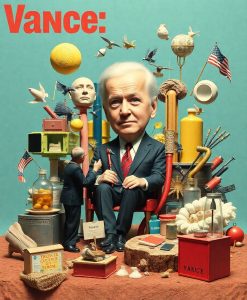Living in the daily rhythms of life, many of us notice subtle shifts—perhaps a moment of forgetfulness, a slower step, or a lingering fatigue that doesn’t quite go away. These sensations, often dismissed or ignored, can quietly influence our perception of ourselves and, eventually, our ability to perform at our best. When it comes to national leadership, those tiny whispers of concern can become loud questions about whether someone is still able to carry the weight of the role they hold, especially when health issues are involved.
In recent conversations, the topic of President Joe Biden’s health has surfaced, with some voices urging transparency about his ability to serve as commander in chief. Vice President JD Vance emphasized that honesty is crucial—acknowledging that a cancer diagnosis, such as prostate cancer, should not shield the public from asking tough questions about a leader’s capacity to lead. For many, this raises an essential question: how do we navigate the complex terrain of leadership fitness when health challenges are part of the picture?
Addressing the Hidden Layers of Leadership and Health
When we think about leadership, especially at the highest levels, there’s an instinct to focus on policies, decisions, and speeches. But beneath that surface lies a deeply human truth: leaders are vulnerable to the same biological realities as anyone else. It’s easy to forget that the physical and mental stamina required to steer a nation can be impacted by health issues that are often hidden from view.
Living with or witnessing signs of aging or illness can trigger a need to reassess what it means to be “fit” for such a demanding role. Is it about being completely healthy? Or is it about demonstrating resilience in the face of adversity? These questions are not just political—they hit at the core of human experience: how do we measure strength, capacity, and readiness when the body’s natural limits come into focus?
What It Means to Be Transparent About Health and Leadership
For those of us who value authenticity, the emphasis on honesty from leaders is vital. When public figures openly discuss their health, it fosters a culture of trust and understanding—acknowledging that strength isn’t the absence of vulnerability, but the courage to face it openly. For voters, this transparency can help build a more compassionate perspective, recognizing that no one is immune to health struggles.
Yet, the delicate balance lies in respecting privacy while ensuring the public’s right to understand whether a leader’s health could impact their ability to govern effectively. The ongoing dialogue about President Biden’s health, including his prostate cancer diagnosis, exemplifies this tension. It’s a reminder that leadership isn’t just about policy; it’s about the person behind the role, navigating their own human realities.

Why Open Conversations About Health and Leadership Matter
In a world where the pace of change feels relentless, the question of whether someone can sustain the mental clarity and physical energy required to lead is more relevant than ever. For many, hearing that a president or vice president is managing health issues doesn’t diminish their respect—it humanizes them, making their leadership more relatable and authentic.
This openness also encourages a broader societal conversation about health, aging, and the qualities we value in our leaders. It invites us to redefine strength—not as invulnerability, but as resilience and honesty. When leaders acknowledge their health challenges, it can inspire us to embrace our own vulnerabilities, fostering a culture where honesty and compassion are celebrated over perfection.
Ultimately, assessing a leader’s ability to do the job isn’t just about physical health metrics; it’s about understanding the full spectrum of human resilience, transparency, and integrity. As we continue to grapple with these questions, one thing remains clear: honesty about health isn’t a sign of weakness—it’s a testament to true strength.
Learn More: Vance: ‘Need to Be Honest’ About Biden’s Ability to Do Job
Abstract: Vice President JD Vance told reporters Monday that former President Joe Biden’s cancer diagnosis shouldn’t prevent people from questioning whether the Democrat was fit to serve as commander in chief.
Link: Read Full Article (External Site)

